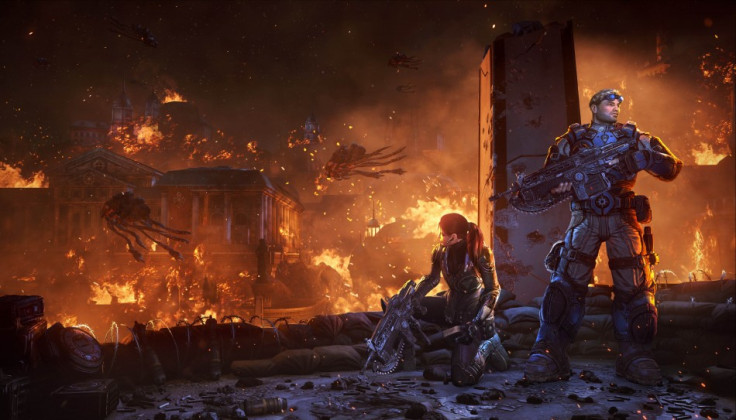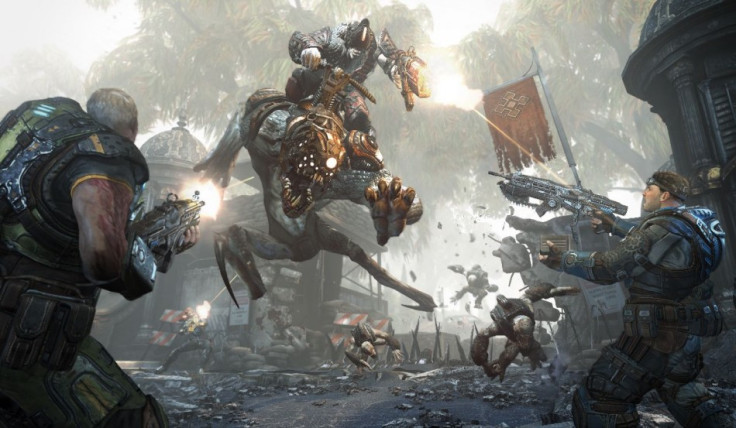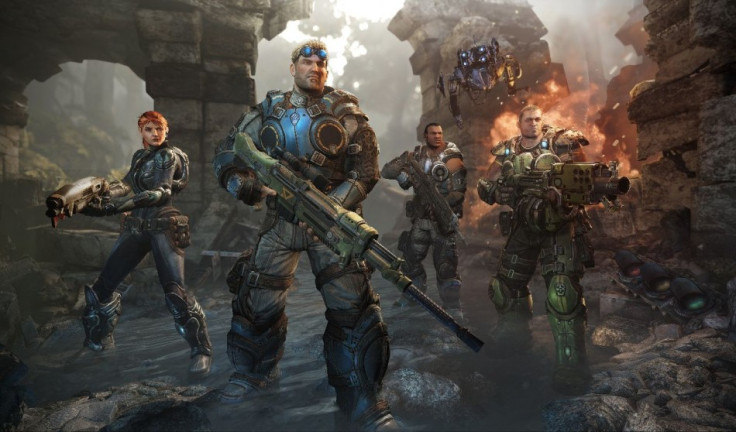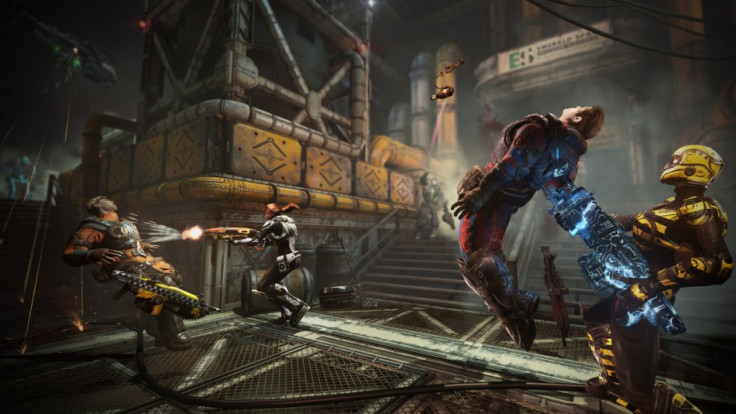Gears of War: Judgment Review

Key Features:
- Developers - Epic Games/People Can Fly
- Publisher - Microsoft Studios
- Platforms - Xbox 360
- Release date - 22nd March
- Price - £49.99
Gears of War: Judgment
The changes were mostly cosmetic, but when Black Ops II tried to kickstart the Call of Duty franchise with a different single player campaign, tweaks to the multiplayer and an aesthetic overhaul, it was nevertheless encouraging. Here was the safest financial bet in gaming's history; if Treyarch wanted, it could have just launched Black Ops 1 again with five extra guns in it and it would have sold out. But the studio had some nerve and in the notoriously conservative AAA market, that's rare.
Epic Games and People Can Fly, developers on Gears of War: Judgment, are being similarly brave. Gone is the series' standard formula of levels on levels driven by plot, and in its place is a stripped down, arcadey, "pure" kind of videogame which grinds Gears down to its fundamental components.
Challenge rooms
You play through a series of self-contained challenge rooms which spawn enemies in randomly generated waves. Imagine the Spec Ops missions from CoD. Gears of War: Judgment is like an entire campaign's worth of those, layered over a vague sort of narrative. As series mainstay Damon Baird, you're hauled in front of a military tribunal to explain exactly what went wrong on Emergence Day, a turning point in Gears lore, when the alien Locust broke open the planet's surface and began exterminating humans.
Via Baird's disjointed testimony, Judgment leads you through dozens of challenge rooms, incorporating elements of tower defence, team deathmatch and scavenger hunting. An early example puts you in a big room with several doors and three turret guns. Two minutes tick down on the clock until the Locust burst in, giving you time to arrange the guns, tool up and set an ambush. Once the first lot are dead, the timer resets, and so on until the level ends.

Once it's over, you're awarded XP points and ribbons which you can boast online or use to unlock guns, abilities and so on. It's not the most original dynamic, but amputating the ploddy, set-piece driven pacing of other Gears games seems like a smart move as the series grows older.
Instead of layering on more oomph and narrative, People Can Fly has boiled GoW down to its nucleus, letting the core running, shooting gameplay breathe and returning the series to its conceptual roots. It's a surreptitious kind of reboot that redefines what a Gears of War game is without losing all the mechanics and mythology that die-hard fans crave. The problem is it's just not that fun.
Gears of War has never been Pinter: Primarily it's about big blokes with big muscles shooting big aliens with big guns.
But before Cliff Bleszinski left Epic Games in 2012, the series at least had some semblance of narrative and although it was often clunky and unimaginative, playing Judgment, it's brazenly apparent just how much the story helped. Trudging from combat room to combat room is a deadening experience; without the veil of story there to give the fighting context, shooting up the Locust just becomes kind of listless.
It's not necessarily that you need the dialogue or the inciting incidents there, it's just that, given the broken up structure of the game, it's hard to build up a sense of purpose or momentum. You just shoot, collect points, rinse, repeat. And although that's all you've ever done in Gears of War, now there's no spectacle there to distract you.
Lumbering
That's not to say that the game isn't polished. As per the Unreal Engine, Judgment is smoothly animated and very glossy. Gore takes centre stage again, with grenades and your chainsaw making stark, bloody gibs out of anything stupid to get in their way, and that adds some visual flair. Elsewhere, this is one of the most colourful Gears games to date, with more levels set in daylight and grassy environments than ever.
Far from the claustrophobic brownery of a lot of the series, Judgment is practically beautiful; with its babbling streams and white architecture, the multiplayer map Gondola is as picturesque as anything found in Skyrim.
But nicely rendered though they are, the characters in Judgment still suffer from the same clunky, lumbering movement as ever. In the past, their muscular lurching felt appropriate, such was the pronounced pace of the story and the action. But in Judgment, action bleeds into action and the tempo is much higher, that slowness doesn't really fit. People Can Fly has gone to great lengths to overhaul Gears structure, appearance, etc. but there's little change to the central mechanics and, although they're solid, they feel incongruous given the change of direction.
The action in Judgment is much quicker; the movement, shooting and cover system should be, too.

Nowhere is that more apparent than in multiplayer, a mostly unchanged branch of Judgment that nevertheless suffers from the same treacly controls as the past three Gears games. It wants to be fast paced, offering up point bonuses for kill streaks and so on, but manoeuvring the chunky soldiers around close-quarters maps is like turning an oil tanker.
There is, however, a new focus on team work that wasn't quite so present in the old Gears games. Teammates pick up assigned roles like medic and bandolier and have to knock heads together to get things done. And although that slows things down a little and puts a tactical spin on each deathmatch, it's hardly a revolution - Killzone has character roles, so does Battlefield. Judgment is perfectly neat and tidy but it's hardly pushing the envelope.
Reinvention
And that's what it comes down to really - there isn't a lot to get excited about here. The streamlined campaign mode and the team orientated multiplayer are new to the GoW franchise, but almost everyone into shoot 'em ups like this will have played through these things time and over for years now. It feels, basically, like the people behind Gears of War are out of ideas.
Whereas the first game pioneered things like the cover system, co-op mode and active reloading, Judgment feels very jog behind. It's not the bloated mess that a lot of big games become after X amount of instalments - the altered single player sees to that - but nor is it a total reinvention, which is what the series, if it will insist on continuing, needs.

With Blezsinski no longer at the helm, Gears of War: Judgment has the potential to be something really different. Instead, it's very in-between. There's ambition here to shake things up, but it's hampered by the return of dull mythology and characters, and tired, gloopy mechanics.
The game isn't quite sure what it wants to be, bundling together loads of different types of "content" into a single confused package. The secular campaign is coupled with Aftermath mode, an extended, more traditional strand of Gears of War gameplay which connects Judgement's story to Gears of War 3. Adding to the directionless nature, multiplayer is frenetic and bloody, but can only be played using clumpy characters and tactical teamwork.
It doesn't quite fit together; Gears of War: Judgment is very muddled.
Whether it makes the game better or worse, it's applaudable when AAA goliaths opt to shake things up. Black Ops II was definitely imperfect but at least they tried. The same can be said for Gears of War: Judgment - It's by no means excellent, but helmets off to People Can Fly for giving it a go.
Nonetheless, it's time to put GoW to bed. The series' best ideas are behind it now and as Judgment shows, even a totally new structure can't revive the tired old mechanics.
Scores:
- Gameplay: 7/10 - The new structure is a big, brave change but the same old clunky Gears physics still remain
- Sound: 7/10 - Solid, fine. Guns sound appropriately gunny and the screeches of the Locust are still scary. The score is bombastic white noise however.
- Graphics: 9/10 - High budget, AAA and incredibly well polished. It's not just the smoothed off edges either - the beefy character design is still distinctive and pushed to the nth degree here.
- Writing: 5/10 - Narrative takes a total back seat in Judgment and the action struggles along as a result. When the characters do speak, it's with the same, frat boisterous "banter" that made other Gears games grating.
- Replay value: 6/10 - This is a big focus for Judgment, which is teeming with things to do. However, more is not always better and the many facets of gameplay in Judgment don't really blend together.
- Overall: 6/10 - It's still big and it's still fun, but Judgment feels like a botched opportunity. Instead of stripping it halfway down, Epic should have gone all the way and totally restarted the whole franchise.
Wondering what our scores actually mean? Then make sure to read ourHow we Review Games article.
© Copyright IBTimes 2025. All rights reserved.






















